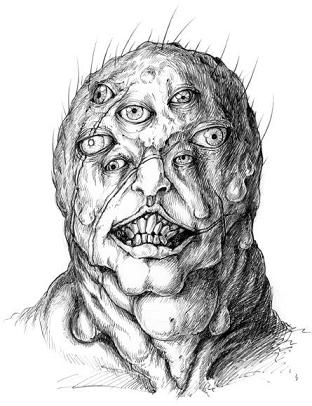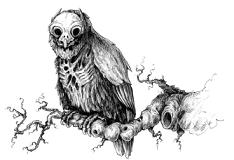Nieve (19 page)

Nieve slipped back into a crouch, fuming. They were pretty good at savagery, too. Noting that one had a whip slung like a coil of rope around his shoulder, and the other a bulbous club rammed into his belt, she more than ever regretted the loss of the fern seeds.
When the deilers returned to the hospital, the guards barked out some commands â along with a few kicks â to get the office workers moving again. They dragged the wagon around in a half-circle and started off down the street, groaning and struggling even more under the added weight. The guard with the whip snapped it once in the air and the groaning stopped, if not the struggling.

As soon as they were gone, Lias was on his feet. “That's it.” He bounded out of the room, cobwebs streaming behind and raising a flurry of dust. He couldn't get out of the creepy, airless house fast enough. Neither could Nieve â she had to save Malcolm! She might have even beat Lias to the open doorway if something hadn't caught her eye.
In one of the chairs, sitting pert on a cushion, was an object she hadn't noticed on the way in. A curiously familiar object. Stooping to retrieve it, she was surprised to see that it was indeed like one she used to own. A china cat, black, with green eyes, a pink nose, and gilded collar. She hadn't seen hers in years, and had in fact forgotten all about it until now. Rubbing the dust off this one, she was even more surprised to find that it had exactly the same chipped ear (she'd dropped hers once), and the same bare spot on the top of its head. (She'd rubbed the paint off hers, stroking it like a real cat, wishing she had one. Mr. Mustard Seed, a stray, had arrived at their door not long after.) Nieve turned the china cat over to examine its base. The back of her neck began to prickle as she ran her finger over the capital letter “N” etched there, raggedly scratched into the porcelain . . . with a penknife? . . . as she had done with hers?
“Mine!” someone said.
Startled, she looked up. A figure, slightly smaller than herself, stood at the other end of the room in an open archway. It was a girl, very pale, with dark hair like her own, and with features
very
like her own . . .
“That's mine,” the girl repeated. “Mine, mine,
mine
. So are
you!
You'reâ”
With a shriek, Nieve dropped the cat and
ran
for her life.

“
W
hat
is
this place?”
Nieve stood, shivering, behind a dead tree. She had streaked past Lias with such speed that he'd despaired of catching up with her. But she herself had to stop short when she almost caught up with the cart, which the captives were dragging across a stark city square. The square had a lone, leafless tree in its centre, that Nieve â then Lias â had taken refuge behind. Not that it offered much in the way of protection from inquisitive eyes. A skeletal screech owl, all bone and feathers, was perched unnoticed on a branch high up, peering down at them.
“No place you'd visit less you had to,” Lias answered, still out of breath. “What happened?”
“Saw something.” She didn't want to describe it. She'd be describing herself.
“There'll be more.”
“Not like that I hope.” She inched away from him. “You
are
a spirit. You've been here before.”
“Aye, I've been. But I'm no spirit. Failed, remember.”
She gave him such a skeptical look, that he added, “This place, Nieve, think of it as a . . . a kind of net. A net that the present passes through as it flows into the past.”
“What?”
“A net, and it catches things. The way memory does, how you remember some things, not others.”
Nieve thought about this. “Are you caught?”
“I am.”
“What about me?”
“Not yet.”
“Okay, so the stuff caught in this make-believe net of yours, the people I mean, can they get back to where they came from?”
“Some can.”
Nieve stared after the wagon, which had taken a turn down a narrow lane. “I'm glad Frances didn't see that guard hit Malcolm. What's happened to her, d'you think?”
“Might be she's still in the hospital looking for him.”
“Yeah, maybe.”
Nieve knew that neither of them thought this likely, since Frances would have attracted too much attention to herself not to get caught. But wherever she was, whatever had happened to her, she'd be counting on them to follow through if they could. Question was,
could
they? Whatever this place was, it was uncommonly . . .
heavy
. She could feel it like a weight pushing down on her, compressing her, sapping her energy. She would have liked nothing better than to make her escape â now.
The cart's noise had grown more distant.
“Do you know where they're taking them?” she said.
“Not sure. The city keeps changing, it's never the same for long.”
“We'll lose them if we don't get going.”
“We will.” Lias made it sound like a good idea.
But they kept on nonetheless, entering the lane and moving cautiously along the dusty track between the looming houses. Outside of the cart, faintly creaking and rumbling ahead, the city was absolutely silent. No cars, no music or voices, no machinery humming or buzzing in the background. No white noise, only a black silence. It was unnerving. But even more so when something suddenly skimmed past with a keening cry. Above them a small, dark shape hurtled along, then vanished down the street.
“What was
that
?”
“Lich-owl,” Lias shuddered. “They say it's cry portends a death.”
“Good thing I never believe what âthey' say, then.”
Brave words. Words Nieve hoped would quell her rising panic, or at least keep it in check as they continued down the lane. The houses on both sides pressed in on them, leaning even more steeply into the already tight passage, as if hungry for occupants. Not that they didn't already have plenty of those. Lias had warned her, but still she was unprepared for the hideous, ghostly faces that appeared in windows they passed. Faces that flickered in and out of visibility, that glared at them bug-eyed, or leered and laughed uproariously, if soundlessly.
“Don't look,” Lias warned.
He didn't have to warn her twice about those ones, but there were others that compelled her to look. One kindly-featured old woman followed her from window to window, smiling sweetly, invitingly. She reminded Nieve of Gran. Drawn to her, unable to resist, she stepped closer. As she did so the old woman's grandmotherly face blossomed with delight and recognition. Perhaps she was a long-lost relative? How wonderful it would be to sink into her arms, to feel safe again, to forget all the frightening things that had happened.
Lias touched the pewter amulet on his cloak and muttered something under his breath. Instantly, the old woman's expression darkened and shifted. Her delight at observing Nieve turned into loathing, her adoring recognition into guile. Her soft features began to melt and contort into a face ghoulish and gloating. She bared her broken, bloody teeth and licked her purple lips . . . and then whirled back into the darkness, as though seized by an unseen hand.
Recoiling and sickened, Nieve stumbled back to Lias' side. “What did you say?” She couldn't help but think that while her brave words earlier were only that, he knew a language more useful, more powerful. The language of ghosts and dead things.
“Told her to flake off.”
“Ah.”
“Picked that one up in your schoolyard.”
“Why don't I believe you?”
He shrugged. “Got me.”
“You pick up a lot of things.”
“I do. Am a scavenger, a scrounger. How I survive.”
“
Who
are you Lias, really?”
“Later for that, Nieve. I promise. Haven't you noticed, the more we speak, the more they're attracted to us. They love the sound of it, our voices are like gold to them. Like . . . breath.”
“Our voices
are
breath. You're just trying to shut me up.”
“Exactly.”
“Exactly? You got that one from
me
. You're not a scavenger, you're a thief, like Lirk said.” Not the kindest accusation, she realized, seeing as he'd just saved her skin.
“There's only one thing I want to steal and you don't have it.”
“Glad to hear it.”
They walked along in silence for a few moments, but she couldn't
not
ask.
“Who does?”
“Will you
hush
.”
He paused, listening closely. Before she could protest, he yanked her into another open doorway.
An eerie sound slit open the silence, a howling and baying that rapidly grew louder â and louder still â until finally a fearsome pack of wild dogs appeared at the bottom of the lane. In seconds, they were streaming past. Thirty, forty, frothing, red-eyed, black beasts running as one, like a many-headed river, turbulent and raucous. Nieve and Lias pressed back farther into the darkness of the house as the creatures coursed past, their feet never once touching the ground, a spectral horde. Not a single speck of dust trembled in the air after they had gone.
“Hell-hounds,” Lias whispered, as their cries were swallowed up in the depths of the city. “Let's get out of here!” They hustled out of the house before the walls clapped shut on them, which they had been straining to do, bending and creaking. Once out and moving again, he added, “Old Shock, your doctor's dog, he's got some of that in him.”
“Artichoke? Get lost.”
“How do you think he was able to fight Gowl? How could he have led you through the dark so easily if he didn't have some of the dark in him?”
“I thought we weren't supposed to talk?” she challenged, irritated. Artichoke was a wonderful dog, but ordinary, nothing like those baying beasts.
She
was ordinary, her world was ordinary â not dull, not empty, but not like
this,
where everything was sinister and unreal and horrifying.
A coconut-sized clod of earth, stuck with shreds of dried grass and bone and buttons, was lying in the lane before her and in her annoyance she gave it a kick, a fiercer one than intended. The clod exploded into a cloud of dust and flying fragments, and in doing so released a small, furry, bat-faced man, who'd been tucked up inside. This little man jumped to his feet and began to hop around furiously, shaking his fist at her. Protesting still, he charged toward one of the buildings and wriggled through a crack in the steps.
Lias was about to comment, but before he could, she turned an angry eye on him. “I
don't
want to know.”
They continued in silence, Nieve's a simmering one, which, if nothing else, stood her in good stead for what was to follow.
O
n leaving the lane behind they entered a maze of streets, moving stealthily behind the cart, which had picked up its pace following a sharp volley of whip-snapping. In this part of the city the buildings they passed were more of a random clutter, a graveyard of old styles, crumbling and derelict, a number decorated with gargoyles â hideous, leering faces that appeared to leap out at them but were insensible, too dry-throated even to spew fetid water on them. Most of the buildings, the tenements and shops and taverns, were as empty as shells. All facade, no threat, as though someone had simply dreamt them up and hadn't bothered to fill in the details, including the ghosts.